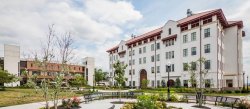NSF Grant Funds Scholarships for 30 Future K-6 Math Teachers
Students will be prepared to teach in New Jersey’s high-need schools
Posted in: CSAM Research, Mathematics

With support from a $1.1 million National Science Foundation (NSF) grant, eligible Montclair State mathematics majors will soon take part in an innovative collaborative program between the College of Science and Mathematics and the College of Education and Human Services that will prepare them to teach math in the New Jersey elementary schools that need them most.
“It is critical that students interested in careers in education have programs that prepare them to become outstanding teachers,” says College of Science and Mathematics Dean Robert Prezant. “This innovative project will provide students with remarkable and creative preparation within an inquiry-based program that deeply prepares them for the demands of working in today’s education system.”
Ten students per year will receive grant-funded scholarships and stipends to be part of the NSF Robert Noyce Teacher Scholarship Program, which addresses the current shortage of high-quality science, technology, engineering and math (STEM) teachers by encouraging talented students to ultimately teach in high-need schools. It has awarded Montclair State’s “Preparing the Effective Elementary Mathematics Teacher” project team funding for three years.
The project’s principal investigator, Montclair State Mathematics Professor Erin Krupa, and co-principal investigators Mathematics Professor Steven Greenstein, Center of Pedagogy Director Jennifer Robinson and County College of Morris colleague Diana Aria, emphasize that the grant will enable them to grow this unique program and actively recruit math majors.
According to College of Education and Human Services Dean Tamara Lucas, the grant program reflects the University’s long-standing commitment to preparing outstanding STEM teachers. “We have received well over $25 million in recent years to support STEM teacher preparation. This important new grant furthers our mission of providing Montclair State students with the essential knowledge and skills they will need to be excellent elementary math teachers – and make a lasting and positive impact on the lives of countless young people across New Jersey.”
“We’ll be one of the only programs across New Jersey to emphasize exemplary elementary mathematics education through our teacher candidates,” notes Robinson, who will work on building partner relationships between the University’s departments of Mathematical Sciences and Elementary Education. Together with Aria, she will also strengthen ties with seven area community colleges in order to recruit transfer students into the program.
Giving Opportunities to Students
The team will build on an earlier NSF Noyce Capacity Building grant for developing a mathematics major for students wishing to be certified to teach K-6 students. “The earlier grant did not provide opportunities for students – which is why we are very excited about this new award,” says Krupa.
Now, through an innovative curriculum, the project’s Noyce Scholars will be able to conduct research in elementary school classrooms. The team will also strive to build a sense of community among Noyce Scholars through a program of community-oriented field experiences and seminars. Research focusing on the project’s impact on the Noyce Scholars’ beliefs about mathematics and mathematics teaching is another key project component.
Greenstein notes that once program graduates begin teaching, they will receive ongoing support through monthly seminars and access to a professional learning community based at Montclair State. “Program graduates will receive extraordinary preparation, not only for the cultivation of their future students’ STEM interests and aptitudes, but also for additional school-based leadership opportunities,” he explains.
Krupa says: “The grant honors my quest to bring funds into the Department of Mathematical Sciences to support math students, as well as Dr. Greenstein’s vision for the exemplary preparation of elementary teachers, and Dr. Robinson’s ability to forge strong collaborations across the University and with partner schools and districts.”
